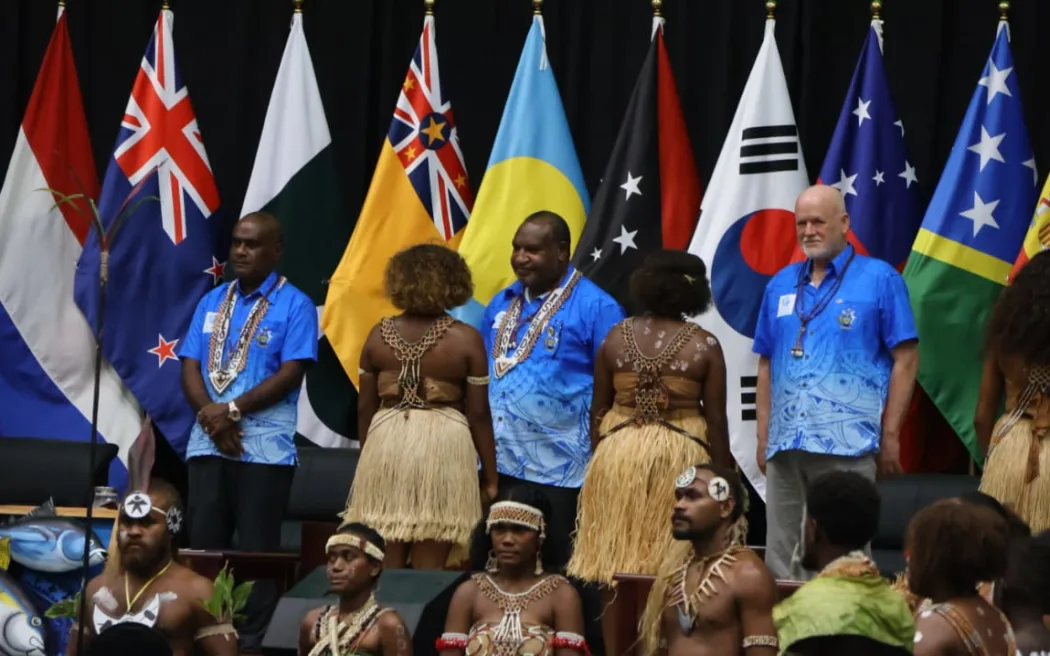Pacific Leaders, Fisheries Ministers, Chief Executives and Oceans organisations are in Honiara this week unpacking one of the most widely known global sustainable development goals – SDG 14.4 actions for Sustainable Fisheries.
Ahead of today’s opening formalities at the ‘Iumi tugeda for delivering SDG 14.4-Achieving sustainable fisheries’ conference, a high-level East New Britain Initiative session saw Fisheries Ministers from Papua New Guinea, the Marshall Islands, and the Federated States of Micronesia sign off on a world-leading tripartite commitment aimed at growing sustainable tuna markets.
The newly-inked strategic implementation MOU provides an innovative ‘100×100′ framework setting targets for the sustainable management of the 7.5million square kms represented by the Tripartite EEZs.
The 100×100 framework sets its sight on two key areas – 100 percent e-monitoring on all licensed fishing vessels, and 100 percent dockside offloading of tuna catches from those vessels.
Anticipating keen interest in the work of the ENBi Tripartite from the Summit, Republic of Marshall Islands Minister of Natural Resources and Commerce, Anthony Muller said, “We have been told before that our aspirations are too ambitious.
But our shared commitment to sustainable fisheries management and equitable tuna value chain participation is unwavering. Over a decade ago, we implemented the Vessel Day Scheme in the face of international scepticism and opposition. The 100 x 100 framework is the next step in delivering ecological resilience for our shared oceans and economic resilience for our people. There’s a sense of momentum and we are excited at the discussions to be had this week.”
The MOU commits the tripartite members to support each other’s primary processing efforts, ensuring more revenues from the global tuna value chain remain in the region of capture. The 100×100 framework also provides space to brainstorm further on market transformation opportunities for Pacific tuna fisheries.
While the tripartite MOU is new, the countries’ end goals are not. For decades, Pacific nations have sought to address their general exclusion from global tuna value chains. Over the years, the journey of the eight Parties to the Nauru Agreement and the historic Vessel Day Scheme has highlighted what a group of nations unified by their common ocean can do. But a system still dominates through which distant water fishing fleets take catch from Pacific nations’ waters to foreign shores for processing, where it is then shipped back in cans for sale to the same countries in which it was caught.
“We can do better. We will do better. And we welcome partners to join us as we transform our fisheries to deliver enhanced benefits for the environment, for our people and for global consumers,” noted the initiating champion and host of the founding meeting of the East New Britain Initiative, Papua New Guinea Minister of Fisheries and Marine Resources, Jelta Wong.
The hope of the tripartite members is that their leadership of the 100×100 framework will galvanize a regional approach through the ENBI that drives more tuna value chain activities and benefits into the Pacific Islands.
“We are stronger when we are working together. If we get this right, this can be a truly transformative moment in global, sustainable fisheries development for SDG14,” said Elena Akinaga, Federated States of Micronesia Secretary of Research and Development.
Presentations continuing the momentum of the special ENB initiative event hosted at the FFA Conference Centre Monday will feature the Honiara Summit programmme, which ends with an Outcomes document and closing plenary, on Thursday 27 February.














